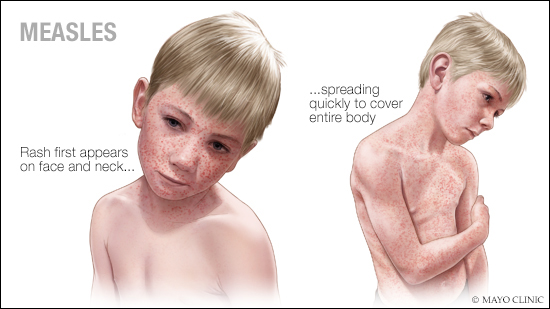-
Featured News
Mayo Clinic Q and A: Treating measles — managing symptoms until the virus has run its course

DEAR MAYO CLINIC: Can antibiotics get rid of measles? If not, what other treatments work best?
ANSWER: No treatment can eliminate a measles infection, as measles is caused by a virus. That means antibiotics, which only work against infections caused by bacteria, are not an effective treatment strategy for measles. No antiviral medications can effectively treat measles either. Treatment for measles involves managing the symptoms of the illness until the virus has run its course. But there is an effective and safe way to prevent measles: get the measles vaccine.
Measles is an infection that was once common in childhood. Now it's been largely eliminated, thanks to the vaccine. Recently, the illness has seen a resurgence, however, due to declining measles immunization rates. But because most people have not seen someone affected by measles, the severity and danger of this serious illness often is underestimated.
Measles usually starts with a mild to moderate fever, along with a persistent cough, runny nose, inflamed eyes and sore throat. This relatively mild phase of the illness may last two or three days.
The measles rash begins to appear about two weeks after a person becomes infected. The rash consists of small red spots, some of which may be slightly raised. Spots and bumps in tight clusters give the skin a splotchy red appearance. The rash appears on the face, and then spreads down the arms and trunk, and over the thighs, lower legs and feet. As the rash develops, fever rises sharply, often going as high as 104 F to 105 F.
As the illness subsides, the rash gradually fades — first from the face and last from the thighs and feet — as other symptoms disappear slowly, too.
Measles can trigger serious medical complications that may require hospitalization, particularly in young children. Common complications include bacterial ear infections, bronchitis, laryngitis, croup and pneumonia. About 1 in 1,000 people who get measles develops encephalitis — an inflammation of the brain. And 1 to 3 in 1,000 dies as a result of complications from measles. Measles is particularly dangerous for pregnant women, as it can cause preterm labor and low birth weight, and raise the risk for maternal death. Risks also are higher for people whose immune systems don't work properly, as well as for infants, children and teens.
Measles treatment involves measures to ease symptoms while the virus is active, such as taking fever-reducing medication. Research has shown that children with low levels of vitamin A tend to have more severe cases of measles, so giving vitamin A to children with measles may lessen the severity of their symptoms. If a person develops a bacterial infection, such as an ear infection or pneumonia, as a result of measles, an antibiotic may be useful to combat that infection. But again, antibiotics will not work to fight the measles infection itself.
Measles is highly contagious because the virus replicates in the nose and throat. When someone infected with measles coughs, sneezes or talks, infected droplets spray into the air, where other people can inhale them. The infected droplets stay in the air, or they may land on a surface, where they remain infectious for several hours. You can contract the virus simply by breathing the air in the room or by touching your mouth, nose or eyes after touching an infected surface. About 90% of people who don't have immunity to measles and are exposed to the virus will become infected.
The only way to combat measles is with the vaccine. The measles vaccine takes effect within 10 to 14 days after receiving it, and once a person has developed immunity to measles, it lasts a lifetime. Measles is an extremely contagious illness that can lead to serious and sometime fatal complications. The measles vaccine is safe and highly effective at preventing this illness. — Dr. Gregory Poland, Vaccine Research Group, Mayo Clinic, Rochester, Minnesota
****************************
Related Articles
- Infectious Diseases A–Z: Be protected against measles before you travel published 9/16/19
- Infectious Diseases A–Z: Why it matters if U.S. loses measles elimination status published 9/2/19
- Infectious disease and vaccine hot topics: Lyme, measles, flu and HPV: Mayo Clinic Radio published 8/11/19
- Infectious Diseases A–Z: Measles cases in 30 states published 8/5/19
- Infectious Diseases A–Z: Do adults need a measles vaccine? published 5/13/19
- Mayo Clinic Q and A: Measles vaccine takes effect within weeks, also safeguards health of others published 5/10/19
- Infectious Diseases A-Z: The 3 Cs of measles published 4/22/19
- Infectious Diseases A-Z: Why the measles virus is so contagious published 4/9/19
- Infectious Diseases A-Z: Battling a myth about measles vaccine published 4/1/19







